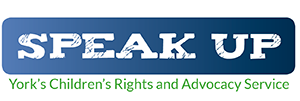

Different types of advocacy
Advocacy can either take place on an instructed or non-instructed basis.
Advocacy provided by Speak Up is mostly instructed. This is because a key principle of advocacy is that it is led by the child or young person, and that advocates act on their instruction.
There are certain circumstances where it might be appropriate to take a non-instructed approach.
Instructed advocacy
An instructed approach is where the young person tells the advocate what they would like them to say and do.
The advocate’s role is to support the young person to explore their views and feelings, and to help them communicate these in a way that puts their point of view across clearly. The advocate supports the child or young person in what they want to achieve.
Most advocacy will fall under this approach, in line with the National Advocacy Standards.
Non-instructed advocacy
According to Rick Henderson, Defining Non-Instructed Advocacy, Planet Advocacy, 2006:
Non-instructed advocacy is taking affirmative action with or on behalf of a person who is unable to give clear direction of their views or wishes in a specific situation. The non-instructed advocate seeks to uphold the person’s rights; ensure fair and equal treatment and access to services; and make certain that decisions are taken with due consideration for their unique preferences and perspectives.
All children and young people have a right to have their views taken into consideration when decisions are being made about their lives (Article 12, United Nations Conventions of on the Rights of the Child, sections 17, 22 and 47 of the Children Act 1989). This applies even if the young person is unable to communicate clear instruction.
A non-instructed approach should only be undertaken as a last resort when possible communication options have been explored with the young person.
It is appropriate to take a non-instructed approach when any of the following apply:
- the young person is unable to clearly and specifically communicate their wishes, feelings and instructions by reason of age, learning disability, communication disorder, mental ill health or debilitating illness
- the young person lacks the capacity to be able to understand specific issues
- the young person lacks the capacity to be able to understand the consequences of actions/inaction
- the young person lacks the capacity to make informed decisions
The provision of non-instructed advocacy enables children and young people with significant communication needs to still have access to advocacy, aligning with the National Advocacy Standards that every child should have equal access to advocacy provision.
The models of non-instructed advocacy focus on ensuring the young person’s rights and legal entitlements are upheld and represented, and that the advocate’s actions are informed by the young person’s unique preferences and perspectives.
It is imperative that advocates do not express their personal opinion, in line with the National Advocacy Standards, so non-instructed advocacy focusses on understanding the young person through meeting with them, liaising with significant people in their life, and understanding information from assessments and reports. This information can help to pose questions or determinations into whether the young person’s rights and entitlements are being met.
